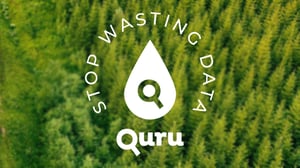How could they altogether make a huge impact on saving our world?
Using Google Analytics is free, isn’t it? Anyone can just create a new account, copy and paste the script to their website and start tracking visitor behaviour and campaign performance. But is it really free? You don’t actually pay for it directly, but you pay for it by giving your data in Google’s consumption and Google pays for managing the data. The evil side of things is that our nature pays for it as well. I hope that after reading this post you don’t again just implement Google Analytics and leave it there without a proper plan in implementing and using the data. If you are actually using your analytics data to improve your business performance or customer experience, then you are in the safe side. Read more below to understand in detail why, it’s truly surprising how much poorly planned data can cause useless energy consumption and waste of data and water.
How does our nature pay for useless click stream data?
Could you ever thought that using web analytics to understand your website visitors’ behaviour could actually be an act for climate? I can and even so when done in a planned manner. Why do I think so? When analysing the visitor behaviour, you can understand what kind and type of content is preferred by your visitors. You can then produce less content or more meaningful content and make sure you are not wasting the work you do. This is one approach. I want to show you another one and even more quantifiable one. Majority of companies from start-ups to large multinational enterprises use Google Analytics or Adobe Analytics to collect data, but surprisingly many of them don’t measure correctly and use data for insights and optimisation. In fact, they produce data waste. When I say wasting data it might sound absurd and meaningless. When put in global scale the waste of data is actually massive global climate issue because the useless data requires energy to be managed and energy production requires water and the logistics of consuming water requires pumping, storing and delivering the water for the use of powerplant. The logistics of water in this case is causing massive carbon footprints globally.
How much water could useless data actually require?
Depending on how your data is queried, processed, stored and re-processed, the average data centre cost for storing 1 Terabyte of data consumes between 20kWh to 50kWh of electricity per year. It takes about 7.6 litres of water on average to generate 1kWh of energy while an average data centre uses 1.8 litres of water for every kWh it consumes. In addition, the Data Centres need water to cool the servers for storing the data.
1 Terabyte of data per year = 20KWh per year20kWh per year = 9 litres of water per year
So, collecting web analytics data consumes energy. It does have a major climate affect locally and globally. It may not have that huge effect on a single website, but it could have on tens of thousands of websites or millions. Let’s make a calculation of potential climate save we could do.
There are roughly 30 million websites using Google Analytics. Let’s assume each website transfers and stores 100,000 useless requests per month, that is 1,200,000 useless requests per year. 1 request could be an average of 8000 bytes. This would in total mean 288,000 Terabytes. 30 million websites could in this scenario consume 2,6 million litres of wasted water each year. This is merely an example because one website could by itself generate billions of requests per year and this example is only looking at an example in Google Analytics perspective. So, the reality is far worse. We can say that the use of water in collecting, storing and processing data is crucial. We can also say that you can affect on how important the use of water in your data centres are.
30M websites * 1.2M requests * 8000 bytes/request = 288,000 TB 288,000 TB * 9 litres = 2,59 million litres of water pumped 288,000 TB * 20kWh = 5760MWh = Annual consumption of 320 houses (120m2)Equals the energy consumption of in average 320 detached houses. (120m2)
How can you make a difference? Use the product & recycle when possible.
You can start making difference by beginning to use the product you posses. If you own a bicycle, you don’t just leave it unused. If you buy a pair of shoes, you hopefully buy them for a purpose and you consume them until you recycle them or wore them off. Same applies to data. Begin to use the data you collect. The more you use the data, the more it delivers ROI to your business and more value is driven by each water litres pumped to process your data.
Below is a list of how you can get started.
- Plan your goals and objectives (KPI’s)
- Plan how you can measure your goals with dimensions and metrics
- Report the right data to right people
- Only meaningful data can be used
- Use, read, review, analyse, blend and enjoy
- Optimise your content or ads based on data
- Re-use the old findings for optimisation
- Sell your findings as a report to others
- Re-cycle the data by sharing your findings to others
Make sure you measure meaningful data and use it to improve performance. By doing so you can save the world.


